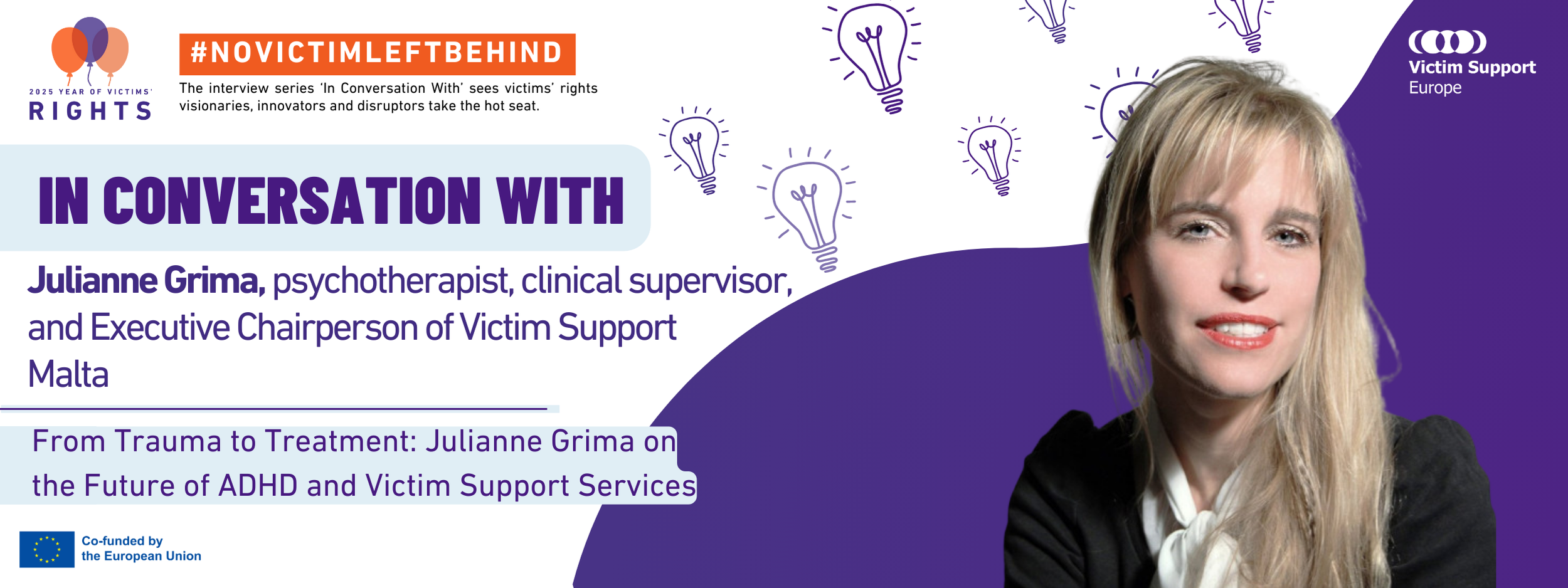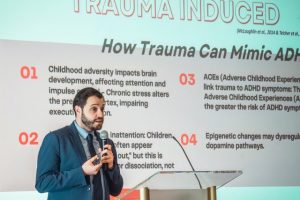

From Trauma to Treatment: Julianne Grima on the Future of ADHD and Victim Support Services
In this interview, we speak with Julianne Grima, an experienced psychotherapist, clinical supervisor, and Executive Chairperson of Victim Support Malta. With extensive training in Gestalt psychotherapy and clinical supervision, Julianne brings a nuanced perspective to both individual mental health care and systemic victim support. As part of her commitment to community needs, she recently spearheaded a national ADHD conference aimed at bridging gaps in understanding and support for neurodivergent individuals. Through this conversation, we explore the insights shared at the conference, the role of collaboration in trauma-informed care, and the evolving landscape of victim support in Malta. Julianne’s reflections highlight the power of empathy-driven leadership in creating inclusive, responsive services for those in need.
Marina Kazakova, VSE: Julianne, could you share more details about the ADHD conference and the key themes being discussed by the professionals gathered there? What are some of the key insights or strategies being shared to better support individuals with ADHD?

Speaker at ADHD Conference by Victim Support Malta, 21st February 2025
Julianne Grima, VSM:The ADHD conference brought together a diverse group of professionals to explore the many layers of this complex condition. We covered everything from understanding what ADHD truly is, to the science behind medication, and how it’s diagnosed using various tools and tests. A strong focus was placed on the connection between trauma and ADHD, as well as the risks of co-occurring challenges like addiction and impulsive behaviors. We also discussed how ADHD presents across the lifespan—in leadership, parenting, education, relationships, and the workplace—while offering practical strategies for focus and self-regulation. The aim was to offer both professionals and the general public a comprehensive, accessible space for learning, sharing, and finding better ways to support individuals living with ADHD.

Attendees at the ADHD Conference by Victim Support Malta, 21st February 2025
Marina Kazakova, VSE: What role do you see this conference playing in bridging the gap between professionals, individuals, and the broader community when it comes to providing better support and understanding for those living with ADHD?
Julianne Grima, VSM: At VSM we consider ourselves witnesses and active participants of our community. When the victims we interact with consistently bring a wave of similar issues, we monitor and explore what alternative services we can collaborate with and if this is not available within our community, we put our heads together and either through a funded project or at our own expense, engage with specialized training to develop more intricate and specialized ways to service those in need. This ADHD conference is no different. Over the past year, the team has observed a rise in adult victims of crime reporting diagnosis in adulthood, with no local specialized services to refer to, we developed the idea of collaborating with a multitude of professionals in the field, bringing them all together so as to provide the community with a one-stop-shop of information and access to professionals. This conference aimed at providing access to information and a broader community to professionals and lay people alike.
Marina Kazakova, VSE: How have the discussions at the conference highlighted the importance of collaborative approaches in supporting individuals with ADHD? Are there any particular examples of strategies or resources that you think could be beneficial to integrate into victim support services?
Julianne Grima, VSM: ADHD is a complex diagnosis that can coexist with other comorbidities like anxiety, depression, OCD and several others. The goal of the conference was to highlight this complexity against a background of social media facile posts that often lead people to diagnose themselves. With regards the correlation between ADHD and victims, at VSM we treat people in their entirety and while a victim might seek our services for support on a specific crime, it is vital for us to understand the person in their entirety. This contributes to how we adapt our service and tailor-make treatment plans to specifically suit the individual’s particular needs.
Aside from the support we provide to victims who are neurodivergent we are also mindful of the professionals within our team who do not subscribe to a neurotypical approach to life. We discuss our own strengths and limitations and endeavor to focus tasks and clients according to the individual’s strengths. This seems to work well for us as a hugely diverse team.
Marina Kazakova, VSE: Could you start by telling us a little about the mission of Victim Support Malta and the key services you offer to individuals in need of psychological, psychiatric, and legal support?
Julianne Grima, VSM: Our mission is to consistently help all victims of all crime. We provide varied services that mostly hinge on the psychological, emotional and physical recovery of the victim. We also provide legal consultation and subsidize legal representation specifically to victims of sexual assault. Although we are victim support, we have nonetheless expanded our support to also include victims of road accidents as well as people affected by suicide. Again, both these services were built on the back of victims of crime who have multi-layered life experiences and the lack of local resources that are specialized in the areas the community seems to drive us.

Julianne Grima speaking at the ADHD Conference by Victim Support Malta, 21st February 2025
Marina Kazakova, VSE: What are some of the current challenges Victim Support Malta is facing, particularly in the context of providing psychological and legal support for victims of crime?
Julianne Grima, VSM: Time and money are always the core issues of any NGO. The team is highly sensitive to just how many people require our support and while our services are uncapped (therefore, victims can continue to access services for as long or as little as they need), we sometimes find ourselves snowed under the massive weight of recognizing our limitations and still wanting to overextend ourselves or help individuals who do not fall under our remit. Finances are always an issue, it would be great if we could remunerate our team at their market value or if we could employ more team members so that our core team wouldn’t need to have multiple roles and this is what we strive to achieve year in, year out. That said, we are very grateful to the sponsorships and donations we receive.
Marina Kazakova, VSE: How do you see the evolving landscape of victim support services in Malta, and what changes would you like to see in the near future?
Julianne Grima, VSM: Victim Support Malta does not exist in a vacuum, we rely on our sister NGOs, government and private sector agencies to collectively support victims – we do not entertain the idea of divide or ownership of clients but one area where we do feel unsupported as a community is the judicial system where the immense delays and mild consequences continue to retraumatize victims leaving the community feeling unsafe. This is a change we need to see locally.
Marina Kazakova, VSE: Can you share with us any recent developments or initiatives that Victim Support Malta has introduced to better support victims, especially in terms of integrating mental health services?
Julianne Grima, VSM: The goal is to always work collaboratively with other NGOs, the private and government services. We have been successful in developing strong relationships with mental health services within the government and the Police as well as individuals who support us from the private sector. We have recently embarked on two new projects that we are treating as pilots with the potential to eventually develop into specialized services, one on cybercrime and fraud and the second Incel sub-culture awareness and prevention.
All our services start from a standpoint of mental health. Our primary concern is the victim’s ability to survive what they have experienced and all our primary endeavors are geared towards ensuring that a victim is stabilized and supported before further interventions are made.
Marina Kazakova, VSE: In particular, we would be keen to hear your perspective on the role of collaboration—especially from a frontline victim support service perspective—in delivering comprehensive victim support. How does collaboration between different sectors (such as law enforcement, victim support, and health care services) contribute to more effective victim support in Malta?
Julianne Grima, VSM: Collaboration is vital to the field of Victim Support – it takes a village! And beyond a village it takes a continent. Malta has become a home to many different nationalities and it is therefore vital for us as a local victim support NGO to be able to contact sister Victim Support Agencies mostly through our umbrella entity Victim Support Europe to ensure the safe repatriation of victims who choose to return home.

